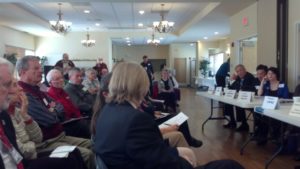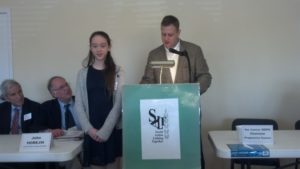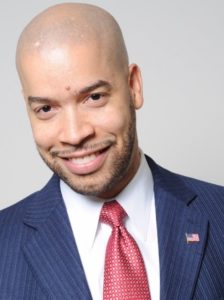Independent’s Day is an occasional opinion column published on Wednesdays. The views and opinions expressed in the column are those of the author and do not necessarily reflect the views of ARLnow.com.
 As a society do we accept the responsibility to care for those less fortunate? As I sat in a packed room at the American Legion Auxiliary Unit in Vienna last Saturday, I asked myself this very question.
As a society do we accept the responsibility to care for those less fortunate? As I sat in a packed room at the American Legion Auxiliary Unit in Vienna last Saturday, I asked myself this very question.
Social Action Linking Together (S-A-L-T.org) sponsored a “Richmond Legislative Wrap Up” which attempted to summarize the effects of their efforts on Virginia’s 2013 legislative session. The SALT organization, founded just over 10 years ago by John Horejsi, is a volunteer led organization focused squarely on the poor. Their website references the Conference of Catholic Bishops and “solidarity with those who suffer, working for peace and justice.”
Wow. This is hardly a political winner but SALT is no political organization. From the vantage point of my campaign last year, SALT was one of the few organizations that highlighted the working poor; those who work in the shadows of our 3rd wealthiest county in the nation.
 With a website copyright dated for 2008, SALT is hardly a well oiled machine but knowing how to get people active and involved has to count for something. Nearly 13 political leaders accepted invitations and our Delegates Patrick Hope and Alfonso Lopez spoke to an audience of about 100 on a cold Saturday morning. Perhaps the most raucous applause was reserved for a 7th grade girl (pictured) named Rae Moar. Rae led her 7th grade class, her parents and a couple faculty members on an initiative to support the “backpack bill.”
With a website copyright dated for 2008, SALT is hardly a well oiled machine but knowing how to get people active and involved has to count for something. Nearly 13 political leaders accepted invitations and our Delegates Patrick Hope and Alfonso Lopez spoke to an audience of about 100 on a cold Saturday morning. Perhaps the most raucous applause was reserved for a 7th grade girl (pictured) named Rae Moar. Rae led her 7th grade class, her parents and a couple faculty members on an initiative to support the “backpack bill.”
What is the backpack bill? From my memory, it was a bill to provide school supplies to children who can’t afford them. Unfortunately, I can’t find one article about this online. But Rae apparently raised money for a lot of backpacks, received a well earned award, and spoke eloquently. Even 35th District Delegate Richard Saslaw felt comfortable stating, tongue-in-cheek, that Delegate Hope better watch out in about nine years.




